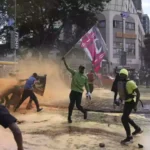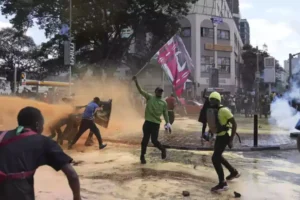In the last few decades, Nigeria has been bedevilled by ceaseless run of seemingly intractable challenges. Over the years, experts have listed several reasons as responsible for the country’s stunted socio-economic and political growth.
Many believe that the problems lie with Nigeria’s leaders, past and present. Some others have also canvassed that the citizens need to have attitudinal change.
As such, on Tuesday, April 2, some eminent Nigerians and some political stakeholders converged on the Trinity Church in Victoria Island, Lagos to discuss the state of the nation and proffer solutions to the challenges plaguing Nigeria.
The event was the fourth Nigerian Leadership Colloquium in celebration of Ituah Ighodalo’s 63rd birthday. The colloquium had the theme ‘Mistakes Nigeria Made.’
It was a day of celebration as the hall was full to the brim comprising Nigerians from all walks of life and ages; especially the youth, and members of the Trinity Church. Many friends of Ighodalo, the celebrant, were also there to honour him.
The event, chaired by Ike Nwachukwu, a retired general and former minister of Foreign Affairs, had Reuben Abati and Professor Olubukola Oyawoye as discussants.
Delivering his keynote speech, Atedo Peterside, Founder of Anap Foundation, said that the members of the Nigerian political and business elite were competing in a game called ‘state capture.’
He defined state capture as a situation where a country that is supposed to work for 200 million people, works for a handful of people.
The former group chairman of Stanbic IBTC Holdings said that the political and business actors were working to ensure that Nigeria only works for them.
“The common trend that I see today, 2024, is that many actors; political and business actors, are actually competing in a game called ‘state capture.’
“The Nigerian state is supposed to work for 200 million Nigerians, but I’m concerned that this set of people are making sure that it doesn’t work for 200 million Nigerians, it only works for them- a handful of people,” he said.
Speaking on the theme of the event, Atedo identified nine major mistakes Nigeria made. This includes the first military coup in January 1966 and a counter coup that followed in July.
He mentioned the civil war, which led to the destruction of many lives and property in the country.
The Anap chairman also mentioned the introduction of religion in politics by the elite, lack of conflict resolution mechanism, enthronement of injustice and rewarding bad behaviours as major mistakes made by the country.
He added that people no longer believe in serving but getting reward from the office and Nigerians no longer believe in their leaders’ words.
Peterside also said that parts of the mistakes Nigeria made was the destruction of standards in the civil service by the military.
According to him, “We have never adopted global best practices of resolving crisis; the words of leaders are no longer their bonds; we enthrone injustice; we reward bad behaviours, among others.”
Speaking on the solutions to the country’s problem, Peterside called for electoral reform, advocating for the use of the National Identification Number (NIN) instead of Permanent Voter’s Card (PVC).
He argued that the former has more elaborate data than the latter, which enables rogue electoral officers to overturn the will of the people.
He also urged citizens to continue holding the leaders accountable for their actions, saying that the whistleblowers must not stop to expose wrongdoings.
He called for a strong opposition to strengthen the country’s democracy and hold the government accountable.
The Chairman of the occasion, Ike Nwachukwu (RTD), posed 38 questions that required genuine attention in considering and proffering solutions
Some of these questions included, “was our unwillingness to renegotiate Nigeria’s continued existence as a country a mistake?”
Nwachukwu pointed out that the solutions to Nigeria’s and its people’s problems will emerge when the nation genuinely addresses and answers these questions and many more that will emerge from this colloquium.
“And I also believe that from these answers will come, quite easily, the will to do right by all manner of peoples and interest groups that form the main ingredients of the Nigerian state and country.
“The 2014 National Conference did. That is why all the delegates by consensus made the crucial recommendations to salvage Nigeria. And I strongly recommend that we do not set them aside.
“Only by courageously facing the truth can Nigerians and Nigeria begin to heal from the mistakes and hurts of the past and commence the transformation to a better future,” Nwachukwu said.
Speaking on the current structure of Nigeria, he stressed that there was the need to decentralise government, warning that the current system was not viable.
He noted that all states in the country had the potential to develop with the available resources at their disposal.
According to him, “We must decentralise the country, every state would be in control of its resources and percentage given to the central government.”
Nwachukwu further called for electoral reforms ahead of the 2027 polls, noting that flawed polls were inimical to the progress of the country and lead to apathy among the populace especially the youth.
He said the youth of the country have tremendous potential that could be tapped into if they are given a chance to excel.
“We can’t have an election where there are so many flaws in the system, not only are we digging the country to oblivion, we are denying young Nigerians the opportunity to lead.”
In his contribution as one of the discussants, Reuben Abati, said that with the high youth population in the country, there was the need for the Federal Government to declare a state of emergency on education and increase investment in the sector, so that the nation’s youths can compete globally.
“We need to capture the youth population via education in a world that has become competitive. This should be a national priority and a national emergency so that we can have youths that can compete in the future,” Abati said.
Abati warned that strong opposition in the country was crucial for democracy to thrive and for good governance, citing examples with Senegal and other countries.
“Informed opposition that is committed to the common good and not name-calling is vital in a democracy,” Abati stressed.
Another discussant, Olubukola Oyawoye, a professor, said Nigeria’s greatest mistake was that, “we have not outlined our vision and our mission.”
The Celebrant, Ighodalo, said honest conversation was the only thing that could change Nigeria.
He said, “It is conversation, conversation, conversation. What is critical to me is that in this business of Nigeria we should go back and discuss Nigeria.
“If the foundation is not right, we have to knock it down and build it again.”
The event was attended by high profile Nigerians, including Donald Duke, former governor of Cross River State; Sam Amuka, publisher of Vanguard Newspaper, business and media executives, among others.
Source: Business Day
















